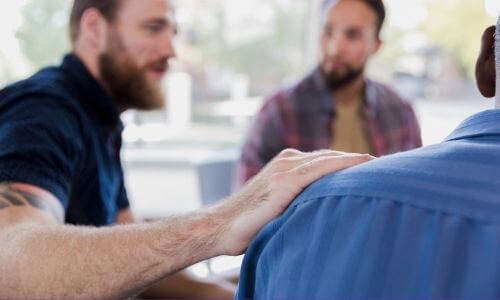November 19 is International Men’s Day. Usually we only hear about International Men’s Day in early March, when the “what-about”isms come out in force around International Women’s Day. And while women’s and gender diverse people lives are impacted the most under patriarchy, it would be ignorant to suggest men don’t suffer too. Some of the issues that get raised on International Men’s Day – the high rate of male suicide and the shorter life-span men have compared with women – could be solved by a gender-equal world.

So why should men get on board with hating the patriarchy too?
It shortens men’s lives
Conforming to masculine norms that are encouraged by the patriarchy is bad for men’s health. A 2007 study found that the more men conformed to traditionally “masculine” ideals, the more they engaged in risky behaviours – like excessive drinking, using tobacco and other risks. These risky behaviours are what contributes to the lower life expectancy in men, according to a report from the World Health Organisation. Men are significantly more likely to die from cardiovascular diseases, road injuries, lung cancer, chronic obstructive pulmonary disease and stroke than women.
It stops men seeking help for health issues
The same study from WHO also reported men in high-income countries are less likely to use health services than women, resulting in poorer health outcomes. Their “it’ll be right” attitude and discomfort in going to the doctor means that when they do seek help, their illness is more progressed, and the prognosis is less positive. This same attitude applies to mental health – feeling “weak” for receiving help is a strong contributor to high male suicide rates.
It invalidates their role as a parent
We are so used to seeing mothers as the primary caregiver, that when Dad takes his children out, he’s “baby-sitting” or “giving Mum some time off”. Being an involved dad has great benefits for both father and child/ren – involved dads are happier and healthier, their daughters are more likely to have higher career aspirations, and their sons are more likely to engage in gender-equal behaviours in their own relationships.
It’s extremely detrimental to men who don’t fit the “masculine” ideals
Men who don’t conform to the rigid, outdated ideals of what a “man” is “supposed” to be are often ridiculed, bullied or worse. LGBTIQA+ men, or even men who other men consider “feminine” face the real threat of physical violence, simply for not conforming. Research from the Human Rights Commission from 2014 states 6 in 10 LGBTIQA+ Australians experienced verbal homophobic abuse and 2 in 10 experienced physical homophobic abuse. Disgracefully, “gay panic” was a partial defense for murder in many Australian states and territories – South Australia was the last state to remove it from legislation in December 2020!
It invalidates their experiences of assault and domestic violence
While women represent the majority of victims of domestic, family and sexual violence, men do experience these things too, mostly at the hands of other men. However, the data on exactly how many men experience domestic violence isn’t great, for a number of reasons. Firstly, men may feel less comfortable reporting the abuse for fear of not being believed or being ridiculed for experiencing assault from a woman or intimate partner. They also may not recognise the negative patterns of behaviour as abuse, because we don’t often hear the narrative of men as the victim-survivor.
Gender equality benefits everyone – studies have shown that in countries where there is a higher rate of gender equality, the life expectancy gap between men and women is smaller and male well-being is higher in terms of welfare, mental health, fertility and suicide.
This International Men’s Day, we’re calling on men to join the fight against the patriarchy and do their bit to create a future where gender equality is a reality – where we all reap the benefits!




